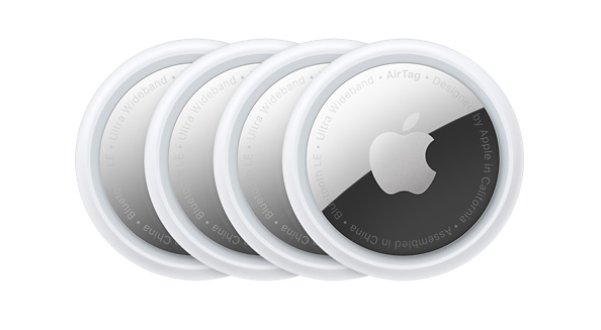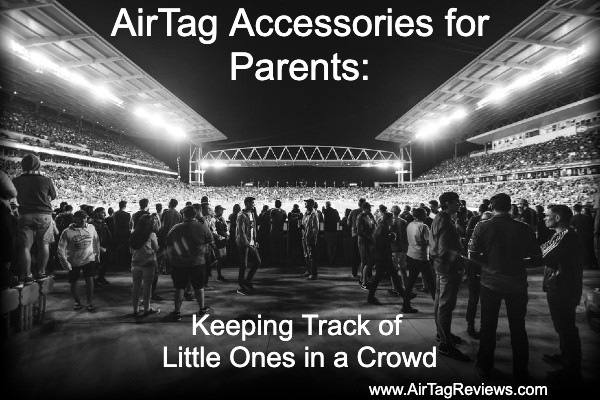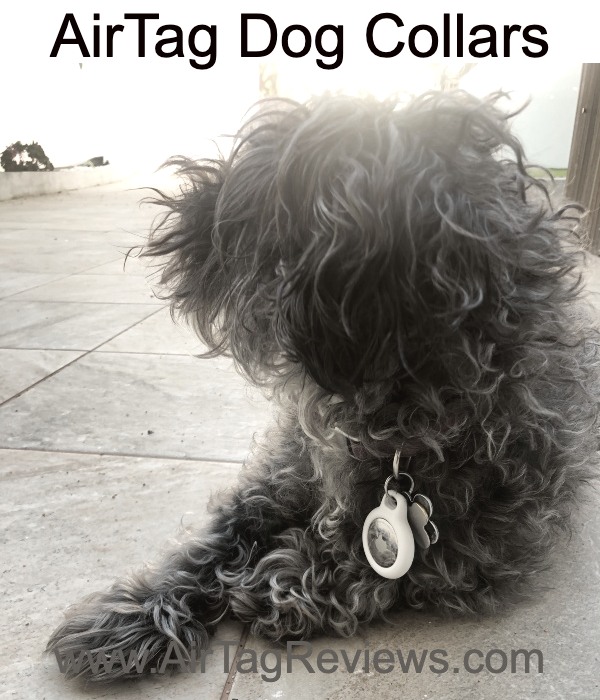Editor’s Note: After reading this, check out our hands-on article reviewing AirTags as Pet Trackers (includes discussion of using the Belkin AirTag Keychain on a Dog Collar vs. AirTag-Specific Dog Collar Accessories)
One of the coolest (and possibly most valuable, if you’re a dog-lover) uses of Apple’s new AirTag Trackers (check out our AirTag launch coverage and AirTags FAQ) is clipping one to Fido’s collar and being sure he’s never lost… Whether you’re worried about your pup running away from home, or if you have the kind of dog who likes to explore off leash while hiking or playing on the beach, dog-finding GPS trackers can literally be lifesavers.
My dogs are a bit too crazy to wander the world off-leash, so for me, Apple’s new AirTag trackers will give me peace of mind in an emergency: AirTags will help me find my dogs if they ever run away!
AirTags have many of the key features needed in a good dog-tracker, at a fraction of the cost:
- AirTags have a year-plus long battery life, with an easily replaceable battery (see more on AirTag Battery Life). Giving Fido an Apple Watch wouldn’t only be expensive (and let’s face it, would be kind of awesome to see his rings at the end of the day), but it would also be impractical… You don’t want to charge his collar every night. An Apple AirTag can clip to your dog or cat’s collar and be good to go for a whole year of safety
- AirTags are water-resistant (and basically water-bowl-proof): My dogs somehow consider drinking of the water bowl to be some sort of cannon-ball contest. Add walks in the rain, chewing on sprinklers, and other dog-hobbies, and having a waterproofing pet tracker is essential. Apple AirTags make great pet trackers, as they are IP67-rated for water and dust resistance (meaning they can handle a thirty-minute-session of meter-deep Portuguese-water-dog-swimming). Read more about AirTag water-resistance on our AirTag FAQs.
- AirTags offer the world’s best pet location system: Apple’s billion-device strong, global Find My network. What good is knowing how many steps Fido’s taken today, but not being able to find him tomorrow. Some of the other pet trackers out there offer admittedly-fun but gimmicky features, but only Apple’s AirTag tracker and the new Find My-compatible Chipolo ONE Spot Tracker (affiliate) let you leverage nearly every iPhone user out there to help you find your lost pup. Read more on How to Use the Find My App to Locate an AirTag on your lost pup here.
- AirTags are inexpensive: AirTags cost $25-30 upfront and don’t require a monthly or annual service plan. That means they save you over $225 the first year vs. the popular Whistle Go Explore Tracker and roughly $100 the first year vs. the FitBark GPS Dog Tracker
So, how do AirTags compare to other dog tracking collars and dog GPS devices? Let’s take a look at some dog- and cat-specific AirTags competitors in the pet tracking arena. Two of the top-rated pet trackers (other than AirTags) are the Whistle Go Explore Tracker and the FitBark GPS Dog Tracker, as discussed below.
How do AirTags Compare to the Whistle GO Explore Tracker for Finding Lost Dogs?
Whistle makes some of the post popular dog tracking collars on the market, including the top-rated Whistle GO Explore. Here are the key features and an assessment of Apple AirTags vs. the Whistle GO Explore Tracker GPS dog collar:
- Price:
- Whistle GO Explore: $129.95 (often on sale at Amazon for ~$100)
- Apple AirTags: (Cheaper)
- Annual Plan:
- Whistle 360° Plan: $95.40/year
- Apple AirTags: (Cheaper if anything at all)
- Location Tracking Technology:
- Whistle GO Explore: 4G + GPS
- Apple AirTags: U1 Ultra-wideband Chip + Bluetooth + Network of Apple iPhones & Apple Watches
- App & Compatibility:
- Whistle GO Explore: Proprietary Whistle App for iPhone & Android
- Apple AirTags: FindMy App built into every iOS device (but not Android compatible)
- Battery Life:
- Whistle GO Explore: 20 days (depending on usage)
- Apple AirTags: Much longer battery life (see our article on AirTags Battery Life)
- Waterproof / Water Resistance:
- Whistle Go Explore: Yes, rated IPX 8, so it’s submergible up to 6 feet (2 meters)
- Apple AirTags: Expect robust waterproofing
- Size:
- Whistle GO Explore: Width: 1.4″, Height: 1.8″, Thickness: 0.7″ – and weighing in at just 0.96 oz
- Apple AirTags: Size is still TBD, but Tile Trackers clock in similarly (see our Tile Bluetooth Trackers vs. AirTags Overview), so expect AirTags to be competitive
- Health & Wellness:
- Whistle GO Explore: Scratching, licking, and drinking tracking – pretty cool but highly dog specific
- Apple AirTags: Not going to track your licking or scratching!
- Global Compatibility and Range:
- Whistle GO Explore: Only works in the United States. Uses 4G cellular network so it can ping back to your app and tell you where Fido is, so long as he is somewhere with cell phone coverage (e.g., probably anywhere in the city but not necessarily if he’s lost in the woods)
- Apple AirTags: Worldwide coverage. But, since it relies on U1 Ultra-wideband and bluetooth, Fido needs to walk within say 300-500 feet (100-200 meters) of anyone with an iPhone (who needs to be in cell phone range too)… So call this anywhere in the world with cell phone signal for AirTags, vs. just anywhere in the US with cell phone signal for Whistle (see our AirTags Range article)
So those are the technical specs, but what are the real-world use-case differences in how you’d use Apple AirTags to find a lost dog vs. a pet-specific tracker like the Whistle GO Explore?
- AirTags Pros vs. Whistle GO Explore for Dog Tracking:
- AirTags are cheaper on a monthly / annual basis: AirTags don’t require a monthly 4G wireless plan
- AirTags work anywhere in the world as opposed to Whistle GO working just in the United States
- Both need somewhere with cell signal to have the ability to call home from afar, but AirTags have arguably better coverage in the US – AirTags aren’t carrier specific, so you just need someone with an iPhone with signal (whether on AT&T, Verizon, T-Mobile, etc.) to walk by Fido for you to find him. With Whistle, you’re using AT&T and need to Fido to be somewhere in AT&T’s coverage universe
- AirTags will have much better battery life than Whistle GO – this is a key advantage of using Apple’s proprietary U1 ultra-wideband chip + bluetooth as opposed to using a 4G wireless antenna and GPS. See our AirTags Battery Life overview for more information
- AirTags Cons vs. Whistle GO Explore for Dog Tracking:
- Whistle Go Explore offers health tracking for dogs – including cool features like monitoring how frequently they drink water, scratch themselves and chew… Then again, these things are pretty easy to see (my dog’s currently asleep on the couch, but if he was itching, I would notice) if you’re home… so put this is in the Pro colum for Whistle / con column for AirTags, but it’s level of usefulness depends on how often you leave Fido home alone
- Whistle Go Explore has a 4G antenna – this is a huge pro on one hand, as it means Fido can “call home” if lost anywhere with cell phone signal (e.g., if he’s down the street sleeping under a neighbor’s porch) without having to be near someone with an iPhone. If Fido’s on the move in an urban area, expect AirTags and Whistle to both help find him quickly – he’ll be in an area with 4G signal and passing by lots of folks with iPhones… If he’s not near other people (let’s say he’s scared and hiding), that 4G antenna will be really useful to find him. On the other hand, the 4G antenna and GPS receiver mean battery life takes a huge hit (have to recharge Whistle Go every 2-3 weeks, vs. multi-year long battery life in AirTags)
Bottom Line on AirTags vs. Dog-Specific GPS Collars for Finding Lost Pets: the Whistle Go Explore and other dog-specific tracking collars (like the FitBark Smart Collar) are available today, offer pet specific-heath tracking features, and use 4G + GPS to keep Fido safe and findable, but at a cost: a high monthly/annual service fee and short battery life. AirTags will be cheaper, offer significantly better battery life, and usable worldwide instead of just in the United States – but without the dog-specific health tracking features, and they’ll require lost dogs to walk within range of someone with an iPhone or Apple Watch to be able to ping back home.
Editor’s Note: Check out our hands-on article reviewing AirTags as Pet Trackers (includes discussion of using the Belkin AirTag Keychain on a Dog Collar vs. AirTag-Specific Dog Collar Accessories)



